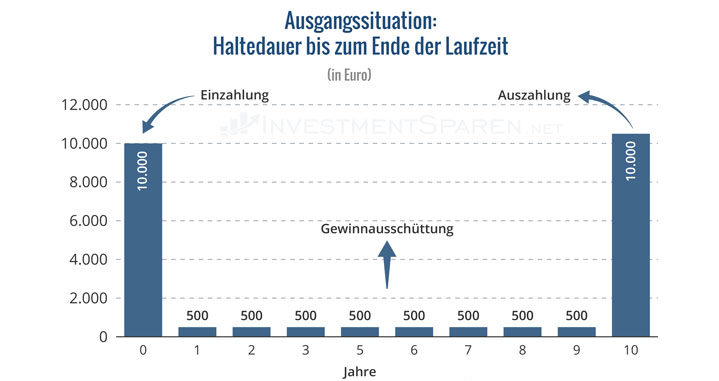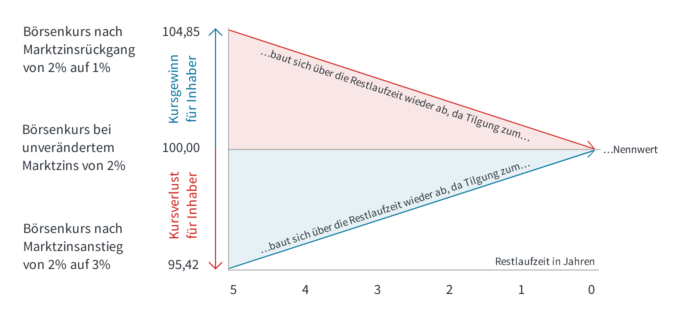An introduction to the bond asset class: what are bonds and why should they be part of every portfolio?
Bonds are debt instruments that represent creditors' rights, in particular the right to interest and repayment. Bonds are also referred to as fixed income securities, debentures, bonds or annuities. Bonds are issued (issued) by governments, banks, and corporations.
The capital raised through bonds is usually used to finance long-term investment projects. In contrast to the share, which can be found on the equity side of the balance sheet, the bond is on the debt side. Investors who buy a bond thus assume a creditor position.

Below we present the most important characteristics of bonds:
- The nominal or face value:
This is the amount of money written on the bond that represents the monetary claim. The nominal value is the basis for the interest on the bond.
- The interest coupon:
The interest coupon is given as a percentage per year (pa = per annum) and indicates the interest rate. Interest is usually paid annually, semi-annually or quarterly.
- The period:
The term represents the period from the issue of the bond to full repayment. Bonds are usually redeemed at maturity.
- The issue rate:
In most cases, bonds are issued at par, that is, at par or equal to 100%. However, there are also bonds that are issued below par, i.e. below the nominal value, or above par.
- The bond price:
Bonds that are traded on the stock exchange have a price based on demand and supply. This course is given as a percentage and can be above or below 100%.
This is how the bond price behaves when interest rates change
The bond price and a change in interest rates are directly dependent. When interest rates fall, the bond price goes up, and when interest rates rise, the bond price goes down. This behavior of the bond price is due to the fact that when interest rates fall, the old, higher interest coupon becomes relatively more attractive and, conversely, when interest rates rise, the old, lower interest coupon becomes less attractive. This is illustrated in the graphic below:

The bond as an important stabilizing element in a private investor's portfolio
For private investors, the asset class of bonds plays an important role in the portfolio context. It is one of the more defensive asset classes compared to shares and cash and possibly real estate and commodities and often serves to stabilize a portfolio. The stabilization comes about because bonds, with their interest coupons fixed in advance and their known maturity dates, generate a high and predictable cash flow. This high cash flow provides the cash for any adjustments to the portfolio. In addition, bonds correlate either slightly negatively or only to a small extent with the other asset classes mentioned above. This means that if the prices of the other asset classes move in one direction, there is a good chance that bond prices will move in the opposite direction. Statistically, stocks and bonds are negatively correlated at around -0.4.
Now is the ideal time to invest in bonds. Corporate bonds currently offer yields of over 7% pa
Arrange a callback from one of our experts now. We advise you free of charge and without obligation and find the best corporate bonds for you.
For investors with €100,000 or more
Free advice & callback service
Geneve Invest's four investment strategies and their bond ratios
In a classic portfolio with the 3 asset classes bonds, equities and cash, the proportion of equities and bonds determine the investment strategy. Genève Invest has defined four different investment strategies with the following bond ratios:
- Strategy 1 : Fixed income portfolio, 100% investment in bonds only.
- Strategy 2 : Fixed Income Plus Portfolio, at least 70% invested in bonds with up to 30% invested in equities.
- Strategy 3 : Balanced portfolio, the bond quota ranges between 30% and 70%, it is usually around 50%.
- Strategy 4 : Dynamic portfolio, the bond quota usually fluctuates between 0% and 30%.
If you want to find out which investment strategy is right for you, you can contact an investment expert from Genève Invest here (without obligation):
READ MORE IN OUR FREE BROCHURE
The Genève Invest Group has been successfully active in the field of asset management for many years and offers you valuable insights into the capital market. Find out why we have had corporate bonds in our portfolio for more than 20 years and why nothing will change in the future.
Numerous studies and research have shown that the determination of the investment strategy and thus also the determination of the bond ratio is by far the most important long-term success factor for the development of the investment:
The most important success factor in strategic investments!
In further articles we will go into more detail about the opportunities and risks and the different types of bonds. You will also find the following other interesting articles on our blog (internal link) on bonds: corporate bonds, high-yield bonds, US bonds, inflation-linked bonds, ETFs on bonds, green bonds and bonds and their risk

